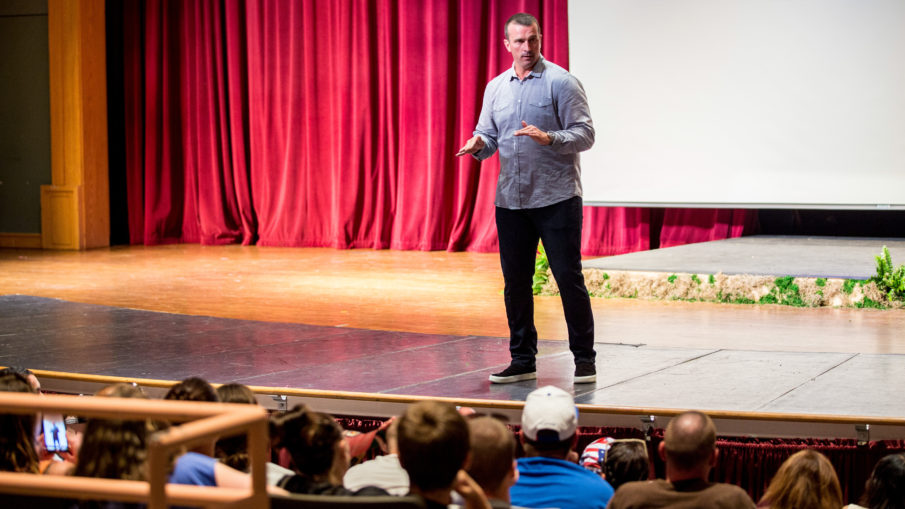Former NBA player Chris Herren recently visited Frederick Community College and opened up about rampant drug-use that ruined his career. He attempted to dissuade those in attendance from turning to opiates and other drugs.
Herren seemed as if he had the world at his fingertips as a teenager. The native of Fall River, Massachusetts garnered massive attention from college basketball recruiters across the country as a senior in high school. Herren was named a McDonald’s All-American that year, an accolade that roughly 22 of the nation’s best high school basketball players receive annually. Although his future seemed bright, his career followed down a dark path, starting the very next year at Boston College.
“I had no idea, when I was 18, that this one line of cocaine would take me over 14 years to defeat,” Herren said of his first encounter with illicit drugs.
Herren described the downward spiral that got him kicked out of Boston College, his dream school, and left him with little to turn toward. Eventually, he found refuge at Fresno State University, where he finished out his collegiate career under hall-of-fame coach Jerry Tarkanian. The Denver Nuggets selected Herren with the 33rd pick of the 1999 NBA Draft, taking a gamble on a talented player with a troublesome past. Soon after, a former high school friend tracked Herren down and introduced him to Oxycontin.
“I had no idea that this little 40-milligram pill would lead to 1600 milligrams of Oxy daily,” Herren said. “I had no clue that a $20 pill would lead to a $25,000 per month habit.”
Herren reached the point where he physically could not play unless he was high. Due to his increasing level of consumption, he felt the effects of withdrawal within a matter of hours.
The Denver Nuggets ended up trading Herren to the Boston Celtics the following offseason. The Celtics were his hometown team, one that he idolized as a kid growing up in Massachusetts. His demons followed him home, however, and Herren was unable to stay off of the painkillers.
In just two years, Herren’s habit forced him out of the NBA. He left the United States to play professionally overseas, where he was introduced to yet another hard drug: Heroin.
It wouldn’t be until the age of 32, after a number of relapses, a near-miss with death, and extensive rehabilitation that Herren would finally escape the clutches of drug abuse.
His appearance couldn’t come at a more opportune time for Frederick County, as heroin and opioid overdoses are quickly rising in the area. As of Oct. 4, a billboard sponsored by the Frederick County Sheriff’s Office reported 93 heroin and opioid overdoses in the county this year. Thirty-one of them resulting in deaths.
Since Herren’s appearance was a community event, he took some time to field questions and comments from the crowd of around 300. Former FCC student and recovering addict Christian Fotos-Lawton received much applause from the audience after he stood up and shared his story.
“You show the people in this room that I’m a son, I’m a friend, and that I’m much more than an addict,” said Fotos-Lawton. “Coming here tonight, I didn’t want to tell anyone that these marks on my arms are what caused me to fail out of this school and get evicted from my apartment three years ago. But today I can stand tall thanks to people like you.”
After the event, Jeanni Winston-Muir, the director of FCC’s Center for Student Engagement, told Fotos-Lawton she would do whatever is necessary to help him re-enroll at FCC.
Other attendees shared their stories and asked Herren questions about drug abuse recovery and prevention.
According to Herren, who has been drug-free for nine years and sharing his story publicly for the last seven, the event was one of more than 250 planned for high schools and communities throughout the year.
“We need to invest more in our children,” Herren said. “We need to make sure that they’re well, and that they never have a reason to turn to drugs in the first place.”

